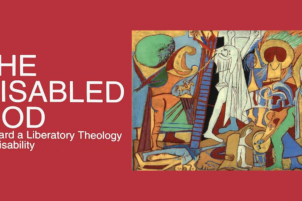I write you today with a story and a request. It was a year ago this week on the Jewish calendar that RespectAbility decided it was time for me to move from Boston to Los Angeles to take the reins of our Los Angeles-based Jewish projects. Los Angeles (and everywhere else) has a shortage of accessible rental units, and finding one is quite a process. Hence I began my search for accessible, extended-stay hotels and other stopgap efforts, and put out word to our Jewish allies in LA that I was looking for a place to stay with a roll-in shower – a necessary accessibility feature for me.
I promptly heard from the spirited singer/songwriter/music producer and community builder Craig Taubman, whose amazing work at the Pico Union Project is worth checking out. He said that he might have friends who fit the bill. It was thus that I met the lovely couple with whom I would live for the next three months until finding my permanent home in LA. They are truly wonderful, and no doubt would have extended this hospitality just because of their generous spirit, as they had done for previous itinerant Jews. But there was something else. Their accessible shower had been built for a beloved family member who had since passed on. They confided in me their joy, and the joy that they felt she would have had, knowing that this investment in accessibility was providing access for someone else, years later.
Often, when we hear the acronym “ROI,” or the words “return on investment,” we think dollars and cents. Many times, though, a return on investment is so much more. It is lives touched, and people helped.
This year, perhaps in response to our Virtual High Holiday Guide, (we hope that) many of your congregations will have invested in interpreters and/or captioning for their services. Surely even one life touched is worth the cost. Yet how much better would it be if your congregation’s investment could multiply its “ROI,” by touching more lives, especially for those who would have nowhere to go.
As the Holidays approach, RespectAbility has been receiving requests from people looking for services that are streaming accessible services with ASL and/or captioning. Many of you reading this are offering streaming services with these features. Think of the feeling to know that not only people in your own congregation, but Jews as far as the web can reach could be benefiting from your investment. Isn’t it wonderful?
In this vein, I encourage you, if your congregation is offering some or all of these services, to email us, telling us the date and time of your service, its style, whether by movement affiliation or otherwise, and what steps or qualifications are necessary to get access. These could range from a donation to reciprocal membership with another congregation to a simple email address to request a zoom link. We will maintain this information for the national Jewish community at www.respectability.org/accessiblehighholidays2020.
If you are not providing services, but are looking for a way to help, think of other ways you can reach people, especially for those who cannot leave home due to the pandemic. We have reports of Rabbis traveling out (or in) to communities to sound the shofar for those stuck at home, enabling them to fulfill the mitzvah to hear the sound of the shofar. If you own a shofar, perhaps you might do the same for your Jewish neighbors—its sounds will easily reverberate six feet apart! Another simple way you can connect with those who can’t leave home these days might be to buy them a holiday appreciation box.
We particularly recommend the boxes by the Celebration Company in Houston, which provides life skills and meaningful employment to individuals with disabilities who, with joy and purpose, provide services and create products that celebrate the good of life. Click for their Rosh Hashanah packages. Either way, let’s work together to create access for as many people as possible.
We still have one more Shabbat Smile this year, to be delivered on erev-Rosh Hashanah. Hence, we wanted to share two articles I wrote on the theme of disability inclusion and the high holidays, published in the Los Angeles Jewish Journal last year, one on Rosh Hashanah, and one on Yom Kippur.
From everyone here at RespectAbility, may you have a good and sweet and safe new year – a Shana Tova u’Metuka,
Matan Koch
Director of RespectAbility California and Jewish Leadership
As We Take an Accounting of Our Souls and Ourselves, a Lesson in Inclusion
Perhaps the most universal theme in the High Holy Days is what our tradition calls a cheshbon ha-nefesh — the accounting of the soul — that Jews do leading up them.
Many may not use Jewish law as their barometer, but most prepare for a new year with an examination of our past year and our actions. Judaism teaches us that the forgiveness of Yom Kippur depends upon an honest, searching and then sparing self-assessment in the month before Rosh Hashanah: the good, the bad, the strengths, weaknesses and opportunities. Whether we think our conduct is judged solely by ourselves, by our society or by God, we all recognize the goal is to be the best versions of ourselves, which we can’t really work on without self-knowledge.
Best practice in disability inclusion is to start with an honest inventory of where you are. The parallels to a good inventory and a good cheshbon ha-nefesh are striking, as, I believe, are the parallels between teshuvah, a word that is more about return and repair then repentance, and a good inclusion plan.
Read the rest at the Jewish Journal
How Mechilah Can Give Us a Model to Go Forward on Inclusion
Many of us spend time leading up to the High Holidays helping congregations and organizations prepare to fully respectfully welcome Jews with disabilities into our communities and rituals. Most of the training is good, and the organizations are almost always earnest. Hence, we can get really optimistic and expect that everything needed will be implemented. And yet, as much as we are excited about the idea of how inclusive things will be, we must also always be aware that they will not be perfect every time.
When Yom Kippur ends, and people start taking stock of the inclusion efforts at their synagogue for the holidays, there will be stories, probably at every congregation in the world, where inclusion did not happen the way we might have wanted. There will be mix-ups, misses and unanticipated situations.
The question is not how to avoid those, because I believe that our tradition teaches us the folly of expecting perfection. The question is, where do we go from here.







